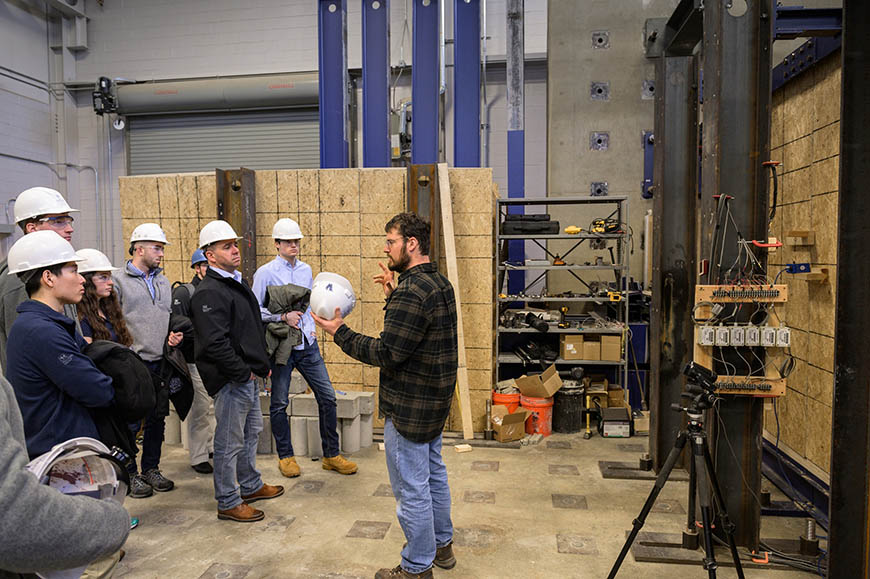Industry Research Provides Structural Engineering Students with Real-World Experience

Villanova University structural engineering students partner with industry to test real-world techniques and products.
Since 2005, the recently named Richard K. Faris ’69 CE, ’70 MSCE Structural Engineering Teaching and Research Laboratory has been providing Villanova’s Civil Engineering students with opportunities for real-world research in a space equipped with full-scale and component size infrastructure elements. In a facility that Civil and Environmental Engineering Associate Professor Eric Musselman describes as “particularly impressive for a school of Villanova’s size,” undergraduates and graduate students have worked on industry-sponsored projects ranging from the testing of steel-frame, multi-story residential building construction for Girder-Slab Technologies, to current testing on shear resistance of wood frame shear walls for the residential structural engineering firm Mulhern & Kulp.
With the growing desire for buildings that invite greater natural light through larger windows and doors, there is increasing concern for accurately quantifying the resistance of wood walls subjected to hurricanes and earthquakes. “Limited data exists,” says Dr. Musselman, who notes that Villanova’s structures lab, with its two-story strong wall, test frames and hydraulic actuators, enables testing based on a worst-case scenario. Beginning with a basic three-panel shear wall with no openings to determine baseline displacement for a cyclic test to failure, further evaluation will be conducted on walls with window and door openings.
Throughout the first year of the three-year research partnership, full time master’s students Remington Barrer, Bryan Seitz and Ryan Schnabel and two undergraduates have fabricated and modified the structures, determined the boundaries and established the test setup, including mounting instrumentation and developing models for data analysis. “The test generates a data point every 1/50th of a second, resulting in about 6,000 data points over the two minute test,” explains Schnabel. With the results, Villanova students, including engineering PhD student Mohammad Fard-Sanei, and faculty will work with Mulhern & Kulp to modify the current design practices to better reflect the test results. Dr. Musselman points out, “More efficient designs will give the firm a competitive advantage.”
Managing partner and founder Mike Mulhern says, “Our vision here at Mulhern & Kulp is to be the industry leader nationwide in residential wood-frame structural engineering; this would not be possible without collaborating with a university like Villanova, which can provide the resources and expertise to help us improve design methodologies that can have a significant impact on the wood frame industry.”
Mulhern & Kulp employs several Villanova Engineering alumni at its Ambler, Pennsylvania, location. Of the 11 who visited the structural lab for the baseline wall test, five were Villanova Civil Engineering graduates. Karl Katterman ’19 CE will be joining Mulhern and Kulp following graduation this spring.
